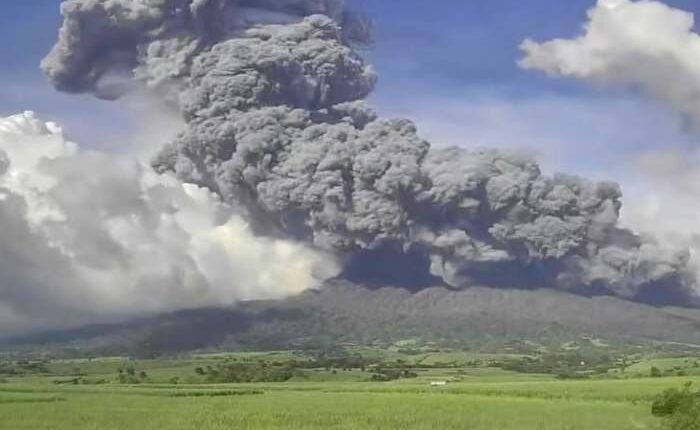
MANILA – Around 87,000 individuals were evacuated in a central Philippine area on Tuesday following a volcano’s brief eruption, which produced a high ash plume and superhot streams of gas and debris that cascaded down its western slopes.
The most recent eruption of Mount Kanlaon on central Negros island did not result in any immediate casualties. However, the alert level was raised by one notch, suggesting the potential for further and more explosive eruptions.
Volcanic ash descended over a wide area, reaching Antique province located over 200 kilometers (124 miles) west of the volcano, across seawaters. This ashfall reduced visibility and posed health dangers, as confirmed by Philippine chief volcanologist Teresito Bacolcol and other officials through a telephone briefing.
At least six domestic flights and a flight bound for Singapore were canceled and two local flights were diverted in the region Monday and Tuesday due to Kanlaon’s eruption, according to the Civil Aviation Authority of the Philippines.
The mass evacuations were being carried out urgently in towns and villages nearest the western and southern slopes of Kanlaon which were blanketed by its ash, including in La Castellana town in Negros Occidental where nearly 47,000 people have to be evacuated out of a 6-kilometer (3.7-mile) danger zone, the Office of Civil Defense said.
More than 6,000 have moved to evacuation centers aside from those who have temporarily transferred to the homes of relatives in La Castellana by Tuesday morning, the town’s mayor, Rhumyla Mangilimutan, told The Associated Press by telephone.
Disaster-response contingents were rapidly establishing evacuation centers and seeking supplies of face masks, food and hygiene packs ahead of the Christmas season, traditionally a peak time for holiday travel and family celebrations in the largely Roman Catholic nation.
Authorities also shut schools and imposed a nighttime curfew in the most vulnerable areas.
The Philippines’ Institute of Volcanology and Seismology said the nearly four-minute eruption of Kanlaon volcano on Monday afternoon had caused a pyroclastic density current — a superhot stream of gas, ash, debris and rocks that can incinerate anything in its path.
“It’s a one-time but major eruption,” Bacolcol told the AP, adding that volcanologists were assessing if Monday’s eruption spewed old volcanic debris and rocks clogged in and near the summit crater or was caused by rising magma from underneath.
Few volcanic earthquakes were detected ahead of Monday’s explosion, Bacolcol said.
The alert level around Kanlaon was placed on Monday to the third-highest of a five-step warning system, indicating “magmatic eruption” may have begun and may progress to further explosive eruptions.
The 2,435-meter (7,988-foot) volcano, one of the country’s 24 most-active volcanoes, last erupted in June sending hundreds of villagers to emergency shelters.
In 1996, three hikers were killed near the peak and several others were later rescued when Kanlaon erupted without warning, officials said.
Located in the so-called Pacific “Ring of Fire,” a region prone to earthquakes and volcanic eruptions, the Philippines is also lashed by about 20 typhoons and storms a year and is among the countries most prone to natural disasters.
Copyright 2024 The Associated Press. All rights reserved. This material may not be published, broadcast, rewritten or redistributed without permission.

















